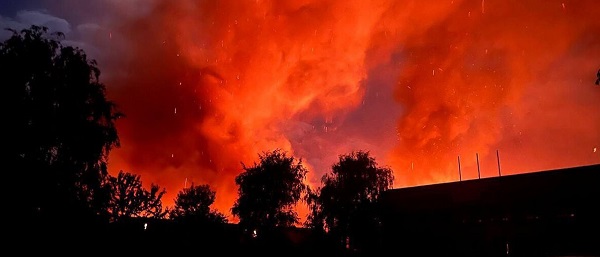conflict
‘It Makes No Sense’: Experts Puzzled By Biden Admin’s Claim That Rafah Invasion Wouldn’t Help Israel Defeat Hamas

 From the Daily Caller News Foundation
From the Daily Caller News Foundation
By JAKE SMITH
The Biden administration’s claim that an Israeli invasion into Rafah would not help the nation defeat Hamas or secure a hostage release deal “makes no logical sense,” several experts told the Daily Caller News Foundation.
White House national security spokesman John Kirby said on Thursday that Israel cannot achieve a “sustainable and enduring defeat” against Hamas by invading Rafah, also claiming that it could jeopardize ongoing negotiations to free the hostages in Gaza. Experts told the DCNF that the claim doesn’t hold water as a military operation is the only way to pressure Hamas into reaching a hostage deal and eventually achieve victory over the terror group.
“An enduring defeat of Hamas certainly remains the Israeli goal, and we share that goal with them,” Kirby said. “Smashing into Rafah, in [Biden’s] view, will not advance that objective, will not get to that sustainable and enduring defeat of Hamas.”
Two high-level defense experts and a former senior U.S. official told the DCNF that Kirby is mistaken and that the only way to ensure Hamas is defeated is through military operations.
“Kirby is wrong,” Mark Dubowitz, CEO of the Foundation for Defense of Democracies (FDD), a Washington-based defense think tank, told the DCNF. “Only the Israel Defense Force’s (IDF) patient, well-planned and well-executed operation has been successful in smashing Hamas and releasing hostages, to date.”
“You can’t defeat Hamas with good vibes and nice words. You defeat them on the battlefield through munitions, through kinetic action,” Executive Director of Polaris National Security and former State Department official Gabriel Noronha told the DCNF.
Kirby and State Department spokesperson Matthew Miller have said that the administration believes if Israel chooses to push into Rafah, it will weaken their hand in negotiations to secure a deal to release the hostages currently held in Hamas captivity. Israel has been negotiating with Hamas through international meditators, including the U.S., for months to reach a deal that would see a temporary ceasefire in the Gaza region in exchange for their release.
“We actually think that a Rafah operation would weaken Israel’s position, both in these talks and writ large,” Miller said on May 9.
“If I’m Mr. Sinwar, and I’m sitting down in my tunnel … and I’m seeing innocent people falling victim to major significant combat operations in Rafah, then I have less of an incentive to want to come to the negotiating table,” Kirby told reporters, referring to Yahya Sinwar, the leader of the military branch of Hamas.
Hamas is unlikely to be more inclined to move the hostage deal along if Israel doesn’t invade Rafah as the terrorist group isn’t concerned with the wellbeing of Palestinians in the region, experts told the DCNF. The IDF has accused the terrorist group of using civilians as human shields and embedding itself within population centers.
“It’s preposterous. It stands in the face of all the evidence we’ve actually seen in this conversation,” Noronha told the DCNF. “There’s been nothing that the White House has released that makes room for any kind of justification for what they’re claiming from the podium.”
The lack of military pressure from Israel would make Hamas less incentivized to reach a hostage and ceasefire deal, Shoshana Bryen, defense analyst and senior director of The Jewish Policy Center, told the DCNF. Hamas agreed to one ceasefire deal in November after coming under intense stress from Israeli forces, but the deal quickly fell apart in December.
“The only serious negotiating Hamas did was in the very early days when Israel’s fury was evident and accepted by most of the world,” Byren told the DCNF. “Hamas leadership saw that it might be defeated on the battlefield, so it permitted a ceasefire and released hostages. Since that time, the Biden administration has worked to constrain Israel — up to and including the withholding of arms approved by Congress.”
“Hamas isn’t stupid. As long as the Biden administration works to constrain Israel, Hamas doesn’t have to give anything,” Byren said.
Experts who spoke to the DCNF also took issue with Kirby claiming that Israel does not need to push into Rafah because Hamas has largely been crippled by Israeli forces since Oct. 7.
“It’s like saying, ‘Oh, we did chemotherapy for a month. We got 80% of the cancer, we’re good to go. We’ll just leave now.’ Again, it makes no sense,” Noronha told the DCNF.
“When someone announces that they want to kill you, they train to kill you, they arm to kill you, they teach their children that if the adults don’t finish the job in this generation, the children are expected to do it in the next generation,” Bryen told the DCNF. “When they say, ‘100 October 7s,’ they’re not kidding.”
Israeli forces seized control of the Rafah crossing bordering Egypt on Tuesday, saying that it was a vital chokepoint to stop the flow of weapons into Gaza, according to The Wall Street Journal. The IDF is moving further into the eastern corridors of Rafah, but has not yet gone into Rafah city, where the bulk of the more than one million refugees are located, according to The Associated Press.
Biden said during a CNN interview on Wednesday that the administration has not seen Israel cross a line in Rafah, but warned of consequences, including halting military aid, if Israel launches a full-scale invasion.
“If Israel had listened to the White House [since the war began], 18 Hamas terrorist battalions would still be standing, dozens of senior Hamas terrorist leaders would still be alive directing terror operations, dozens of Israeli and foreign hostages would still be languishing in the helm of Hamas captivity and Hamas would still be in charge planning the next October 7,” Dubowitz told the DCNF. “The Biden administration’s pressure on Israel has only prolonged the war and the suffering on both sides.”
Artificial Intelligence
AI Drone ‘Swarms’ Unleashed On Ukraine Battlefields, Marking New Era Of Warfare


From the Daily Caller News Foundation
Artificial intelligence-powered drones are making their first appearances on the battlefield in the Russia-Ukraine war as warfare creeps closer to full automation.
In bombardments on Russian targets in the past year, Ukrainian drones acting in concert were able to independently determine where to strike without human input.
It’s the first battlefield use of AI “swarm” technology in a real-world environment, a senior Ukrainian official and Swarmer, the company who makes the software, told the Wall Street Journal in a Tuesday report. While drones have increasingly defined modern battlefields, swarms until now had been confined to testing rather than combat.
“You set the target and the drones do the rest,” Swarmer Chief Executive Serhii Kupriienko told the WSJ. “They work together, they adapt.”
So far, the Swarmer technology has been used hundreds of times to target Russia assets, but was first used a year ago to lay mines on the front, the Ukrainian official told the WSJ. The software has been tested with up to 25 drones at once, but is usually utilized with only three.
Kupriienko told the WSJ that he was preparing to test up to 100 drones at once with the linking software.
A common arrangement used on the battlefield includes one reconnaissance drone to scout out the target and two explosive drones delivering the payload on target, the official told the WSJ.
While Western nations such as the U.S., France and the United Kingdom are also pursuing drone swarm technology, they have not deployed swarm technology on the battlefield the way Ukraine has, according to the WSJ. Currently, autonomous weapons are not regulated by any international authority or binding agreement, but ethical concerns around the technology has led many to call for increased regulation of weapons like the Swarmer system.
The Ukrainian Ministry of Foreign Affairs did not immediately respond to the Daily Caller News Foundation’s request for comment.
conflict
Trump Pentagon Reportedly Blocking Ukraine From Firing Western Missiles Deep Into Russia


From the Daily Caller News Foundation
The Department of Defense has spent months blocking the Ukrainian military from using American and British-made missiles to hit targets deep inside Russia, The Wall Street Journal reported Sunday, citing unnamed U.S. officials.
Undersecretary of Defense for Policy Eldridge Colby reportedly designed the procedure to review requests to carry out the long-range strikes with weapons that are either of U.S. origin or that require American intelligence or use components provided by the U.S., according to the WSJ. Secretary of Defense Pete Hegseth reportedly has the final say on whether Ukrainian forces can use the MGM-140 ATACMS (Army Tactical Missile System) to hit targets in Russia.
The reported blocks on missile strikes coincides with a Trump administration effort to broker a peace deal between Russia and Ukraine. A Pentagon spokesperson declined to comment further on the matter.
BREAKING: President Vladimir Putin reacts to B-2 Flyover pic.twitter.com/1mzVn7DxlW
— Jack Poso 🇺🇸 (@JackPosobiec) August 15, 2025
The Biden administration allowed Ukraine to carry out strikes with ATACMS in November, weeks after President Donald Trump won the 2024 election, the New York Times reported. Trump criticized the move during a December interview with Time magazine.
“It’s crazy what’s taking place. It’s crazy,” Trump said. “I disagree very vehemently with sending missiles hundreds of miles into Russia. Why are we doing that? We’re just escalating this war and making it worse. That should not have been allowed to be done.”
Trump and Russian President Vladimir Putin met in Alaska on Aug. 15 for a summit meeting during which Trump sought to secure a cease-fire in Russia’s war with Ukraine. As Trump greeted Putin, a B-2A Spirit stealth bomber and several fighters carried out a flyover of Elmendorf Air Force Base.
Trump met with Ukrainian President Volodymyr Zelensky and major European leaders on Aug. 18 to update them on the summit.
In July, Trump reached an agreement with NATO where members of the alliance would purchase weapons, including MIM-104 Patriot surface-to-air missiles, and donate them to Ukraine.
-

 International1 day ago
International1 day agoGeorgia county admits illegally certifying 315k ballots in 2020 presidential election
-

 International1 day ago
International1 day agoCommunist China arrests hundreds of Christians just days before Christmas
-

 Business1 day ago
Business1 day agoSome Of The Wackiest Things Featured In Rand Paul’s New Report Alleging $1,639,135,969,608 In Gov’t Waste
-

 Energy15 hours ago
Energy15 hours agoThe Top News Stories That Shaped Canadian Energy in 2025 and Will Continue to Shape Canadian Energy in 2026
-

 Alberta1 day ago
Alberta1 day agoCalgary’s new city council votes to ban foreign flags at government buildings
-

 Business2 days ago
Business2 days agoWarning Canada: China’s Economic Miracle Was Built on Mass Displacement
-

 International15 hours ago
International15 hours ago$2.6 million raised for man who wrestled shotgun from Bondi Beach terrorist
-

 Alberta2 days ago
Alberta2 days agoWhat are the odds of a pipeline through the American Pacific Northwest



